KARACHI: For Ayesha Naimatullah, who lives in a small apartment on the outskirts of the southern Pakistani city of Karachi, Eid Al-Fitr is usually a joyous occasion despite the limited earnings of her husband, who sells fruit at a nearby market.
But this year is different as the family of seven faces imminent deportation to Afghanistan, amid an expulsion drive aimed at foreigners that started in November.
Last month, the Pakistan government said it had started mapping Afghan nationals with Pakistan-issued citizen cards for deportation as part of phase two of its expulsion drive in which around half a million so-called undocumented Afghan refugees have already been expelled. The new post-Eid campaign will mainly target 600,000 refugees who hold Pakistan-issued Afghan citizenship cards (ACCs).
Following the central government’s policy, the government in Pakistan’s southern Sindh province, of which Karachi is the provincial capital, last week announced a crackdown on refugees holding ACCs, and their deportation is likely to begin shortly after the three-day Eid holiday.
“How can there be happiness [on Eid] when they are expelling us? Everyone is happy, but Afghans are all sad,” Naimatullah told Arab News. “They have made yellow cards (ACCs), which Pakistan itself made for us, but they are expelling us.”
In October 2023, Pakistan announced phase one of the ‘Illegal Foreigners’ Repatriation Plan’ with a 30-day deadline for “undocumented” Afghan refugees to leave the country or be subject to deportation, putting 1.4 million refugees at risk.
In phase two of the ‘repatriation plan,’ Pakistan-issued ACC holders will be expelled from the country after the Eid Al-Fitr festival, a major Muslim holiday that fell on April 10. Phase three is expected to result in the deportation of UNHCR-issued Proof of Registration (PoR) card holders.
Until November last year, before it began the deportation drive, Pakistan was home to over 4 million Afghan migrants and refugees, about 1.7 million of whom were undocumented, according to the government. Afghans make up the largest portion of migrants, many of whom came after the Taliban took over Kabul in 2021, but a large number have been present since the 1979 Soviet invasion of Afghanistan.
The expulsion drive started after a spike in suicide bombings last year which the Pakistan government — without providing evidence — said mostly involved Afghans. Islamabad has also blamed them for smuggling and other militant violence and crime.
At the time, cash-strapped Pakistan, navigating record inflation and a tough International Monetary Fund bailout program, also said undocumented migrants had drained its resources for decades.
Despite the challenges facing migrants, Pakistan is the only home many of them know and a sanctuary from the economic deprivation and extreme social conservatism that Afghanistan is grappling with.
While hundreds of thousands have left Pakistan since the expiry of a November 1, 2023 deadline, the South Asian country still hosts around 1.35 million registered Afghan refugees, with an additional 803,200 possessing ACCs, according to the UN Refugee Agency (UNHCR).
However, these ACCs now stand null and void, despite no mention of an expiry date.
“EID OR GRIEF”
Naimatullah, who has two daughters and three sons, recounted her parents’ migration to Pakistan following the Soviet invasion of Afghanistan, saying she and her children has been born in Karachi but still faced the threat of deportation.
“We are in a very difficult situation, neither do we have a place [to live] in Afghanistan, nor is there any life there,” she sighed. “There is nothing at all.”
Kamila Bibi, 16, echoed her mother’s concerns, particularly with regards to her education.
The Taliban administration since coming to power has closed most secondary schools to girls, stopped female students attending universities and stopped many Afghan women working for aid groups and the United Nations.
“There [Afghanistan], a ban has also been imposed on girls’ education. If we go there, all our hard work will go to waste, and my education will also be ruined,” Kamila said.
“I study for six to eight hours a day, and all this hard work of mine could go to waste if they expel Afghans,” she added.
“Eid doesn’t hold much meaning [to us] because my studies are being disrupted. Education is Eid for me, it means everything … Our studies will also be ruined and our future will be destroyed [if deported].”
Kamila’s 14-year-old brother, Naseebullah, who dreams of becoming a doctor, said the threat of expulsion had cast a shadow over the 6th grader’s aspirations.
“It will become difficult to achieve that dream and I may never be able to become a doctor,” he said.
Waseema Hashmatullah, a 65-year-old housewife who survives on the earnings of her son, a daily wager, shared the same sentiment as Naimatullah’s family.
“We are sitting with this same worry. There is nothing there [in Afghanistan],” she said. “This is the worry this Eid.”
Hashmatullah’s daughter, Zarghona, a single mother and a registered refugee, joined her paternal family in Pakistan after a divorce in which she lost custody of her children to a husband who lives in Afghanistan.
“I don’t know how we spent these fasting days [in Ramadan] and now Eid is coming, I don’t know how this Eid will pass,” she said, worried about whether her younger siblings would be able to continue studying upon returning to Afghanistan.
“My entire family is in this dilemma these days. We don’t know whether it is Eid coming for us or grief.”
For Afghans in Pakistan, deportation threat clouds Eid Al-Fitr holiday
https://arab.news/g7vgb
For Afghans in Pakistan, deportation threat clouds Eid Al-Fitr holiday
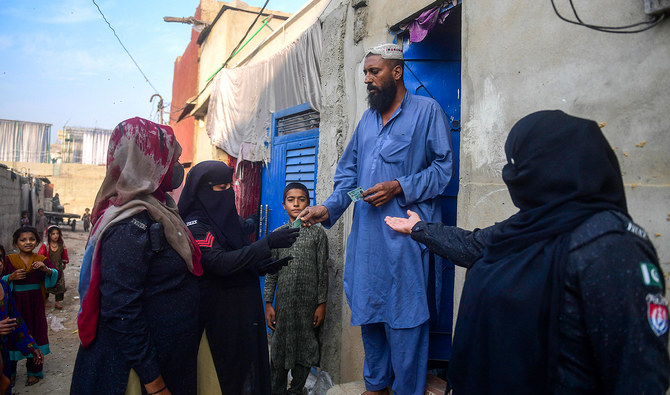
- Pakistan has announced it will start expelling Afghans with state-issued citizen cards after Eid Al-Fitr
- Pakistan has already expelled around half a million ‘undocumented’ Afghan refugees since last November
Four militants killed in northwest Pakistan operation — military
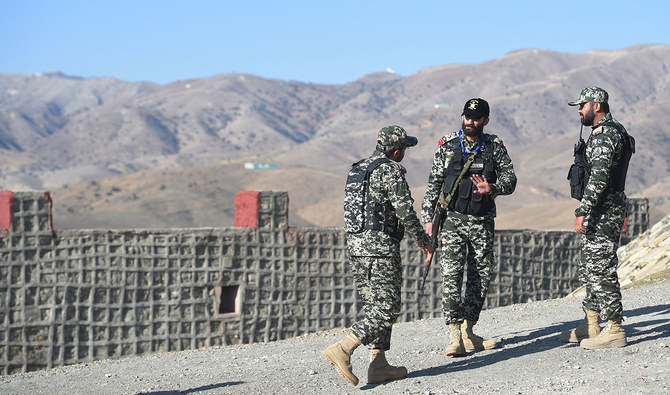
- The development comes amid a surge in violence in Khyber Pakhtunkhwa province, mostly blamed on Pakistani Taliban
- Last week, Taliban militants also abducted a district and sessions judge in the same province, who was freed two days later
ISLAMABAD: Four militants were killed during an intelligence-based operation in northwest Pakistan on Monday, the Pakistani military said, amid a spate of militant violence in the region.
The operation was conducted in the Khyber tribal district of Pakistan’s Khyber Pakhtunkhwa province, according to the Inter-Services Public Relations (ISPR), the military’s media wing.
An intense exchange of fire during the operation killed four militants.
“Terrorists’ hideout was also busted during the operation and a large cache of weapons, ammunition and explosives was recovered,” the ISPR said in a statement.
A sanitization operation was being carried out to eliminate any other threats in the vicinity, the ISPR added.
The development came amid a surge in violence in Pakistan’s northwest, mostly blamed on the Tehreek-e-Taliban Pakistan (TTP), since the group ended a ceasefire with the central government in November 2022.
Last week, TTP militants abducted a district and sessions judge, Shakirullah Marwat, in the same province. The judge was recovered after a joint operation by police and security forces, police said on Monday.
Earlier this month, six people, including five customs department officials, were killed in an attack in Dera Ismail Khan. Two customs officers were also killed in the area in a separate attack earlier.
Militants have also targeted security officials in the province in recent weeks, killing a number of police and counterterrorism department officials.
Both Pakistan and Afghanistan have traded blame in recent months over who is responsible for the recent spate of militant attacks in Pakistan.
Islamabad says the attacks are launched mostly by TTP members who operate from safe havens in Afghanistan. Kabul denies this and blames Islamabad for not being able to handle its own security challenges.
Pakistan confers military award on Turkish land forces commander
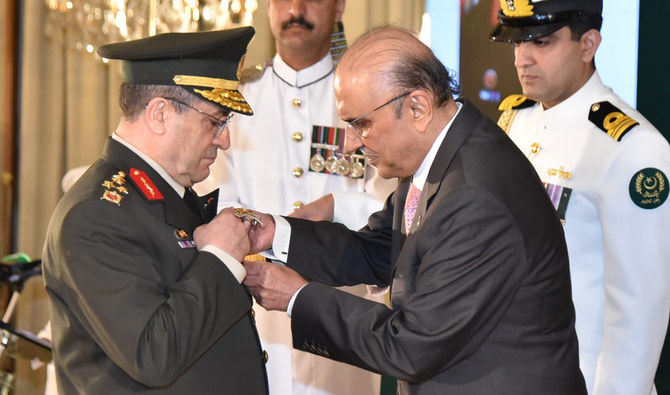
- President Asif Ali Zardari conferred the award at a special investiture ceremony held in Islamabad
- General Selcuk Bayraktaroglu, who is currently visiting Pakistan, also met Army Chief Gen Asim Munir
ISLAMABAD: Pakistan on Sunday conferred a military award, Nishan-i-Imtiaz, on Commander of the Turkish Land Forces, General Selcuk Bayraktaroglu, during his visit to Islamabad, Pakistani state media reported.
Pakistan President Asif Ali Zardari bestowed the Turkish general with the award at a special investiture ceremony held at the Presidency in Islamabad, the state-run Radio Pakistan broadcaster reported.
“The award was conferred upon him in recognition of his illustrious services and contribution toward strengthening Pakistan-Turkiye defense relations,” the report read.
The investiture ceremony was attended by foreign diplomats and high-ranking military officials.
Separately, General Bayraktaroglu called on Pakistan’s army chief, General Asim Munir, and General Sahir Shamshad Mirza, chairman of the Joint Chiefs of Staff Committee, the Pakistani military said.
During his meeting with Gen Munir, matters of mutual interest and measures to further enhance bilateral defense cooperation were discussed, according to the Inter-Services Public Relations (ISPR), the Pakistani military’s media wing.
“Both sides expressed satisfaction over deep-rooted relations between the two countries, based on historic, cultural and religious affinity,” the ISPR said.
“COAS emphasized the need to further strengthen existing military to military cooperation between the two Armed Forces.”
During the meeting, the ISPR added, the visiting dignitary appreciated the role of Pakistan Army in ensuring peace and stability in the region.
Pakistan court hands life sentences to four in 2018 murder of lawmaker
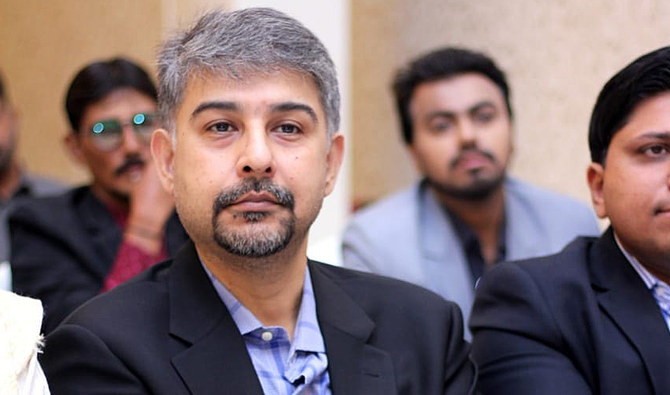
- The accused were convicted of aiding, abetting, reconnaissance, and facilitating murder of Syed Ali Raza Abidi
- Court suspends proceedings against prime accused, citing Supreme Court ruling that prohibits judgments in absentia
KARACHI: A Pakistani court on Monday handed life sentences to four accused who were convicted of aiding, abetting, reconnaissance and facilitating the murder of a Pakistani lawmaker in the southern city of Karachi in 2018.
Ali Raza Abidi, a businessman and politician, who belonged to the Muttahida Qaumi Movement-Pakistan (MQM-P) party, was shot dead outside his residence in the Defense Housing Authority (DHA) area of Karachi.
Police had registered a case against the suspects in the Gizri police station under the Anti-Terrorism Act.
“The evidence shows that all the accused persons in furtherance of their common intention are involved in the commission of murder of Syed Ali Raza Abidi and they are equally responsible for the act,” Zeeshan Akhter Khan, the Anti-Terrorism Court judge, stated in his detailed judgment.
The convicts, Muhammad Farooq, Muhammad Ghazali, Abu Bakar and Abdul Haseeb, were also fined under various sections of the Pakistan Penal Code. They can appeal the verdict within 15 days.
The court, citing a Supreme Court judgment, said since a case against absconding accused, Bilal, Hasnain, Ghulam Mustafa and Faizan, could not be proceeded in absentia, it was placed on dormant status until their arrest or appearance before the court.
Abidi was elected as a Member of the National Assembly (MNA) on the ticket of the MQM-P in the 2013 general election. He, however, quit the MQM-P following the party’s formation of an alliance with the rival Pak Sarzameen Party (PSP).
Despite briefly rejoining the MQM-P in December 2017, Abidi ultimately parted ways with the party in September 2018. He was killed months later on December 25, 2018.
Pakistani PM meets Malaysia’s Ibrahim on WEF sidelines, invites on official Islamabad visit
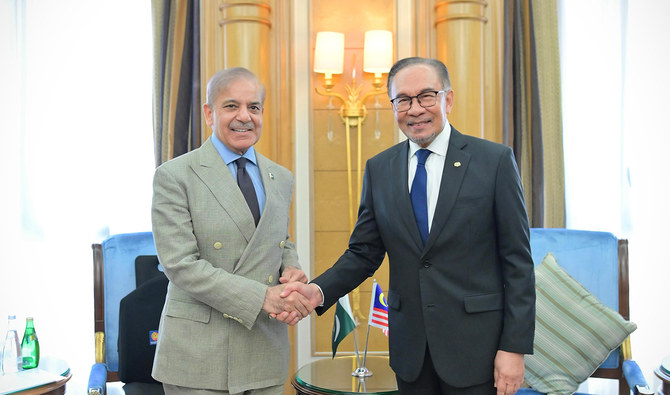
- Shehbaz Sharif was in Riyadh to attend a WEF special meeting on Global Collaboration, Growth and Energy for Development on April 28-29
- The Pakistan PM invited Malaysian traders and businessmen to visit Pakistan to discuss expansion of bilateral trade, investment relations
ISLAMABAD: Pakistan’s Prime Minister Shehbaz Sharif on Monday met his Malaysian counterpart Anwar Ibrahim in Riyadh and invited him to visit the South Asian country, Sharif’s office said.
The two leaders met on the sidelines of a two-day World Economic Forum (WEF) summit in Saudi Arabia’s capital of Riyadh, according to PM Sharif’s office.
During the meeting, both sides agreed to further develop relations.
“The two leaders also agreed to hold the next meeting of the Joint Ministerial Commission in Islamabad soon,” Sharif’s office said in a statement.
“The prime minister reiterated his invitation to Malaysian Prime Minister Anwar Ibrahim to pay an official visit to Pakistan.”
The two leaders discussed bilateral ties in the fields of education, science and technology, livestock and trade, and vowed to further enhance cooperation in the future, according to the statement.
PM Sharif also invited Malaysian traders and businessmen to visit Pakistan to discuss the expansion of bilateral trade and investment relations.
The Pakistan prime minister was in Riyadh to attend the WEF special meeting on Global Collaboration, Growth and Energy for Development on April 28-29.
Sharif spoke about Gaza at the closing plenary of the two-day summit and held several bilateral meetings, particularly with Saudi officials, during the visit.
No peace in the world without ceasefire in Gaza, Pakistani PM says at WEF
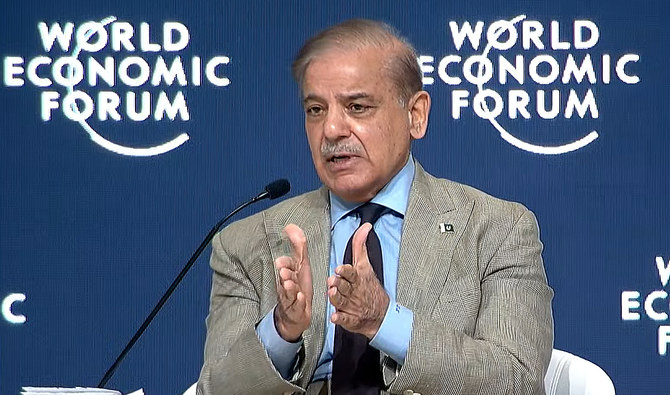
- Pakistan does not recognize Israel and calls for an independent Palestinian state based on pre-1967 borders
- Sharif is in Riyadh for two-day World Economic Forum summit on growth, has met top Saudi leaders on sidelines
ISLAMABAD: Pakistan Prime Minister Shehbaz Sharif said on Monday there could be no peace in the world without a permanent ceasefire in Gaza, as Israel’s attacks on the besieged Palestinians territory continue.
The statement came during the prime minister’s address at the closing plenary of a special two-day World Economic Forum (WEF) summit held in Riyadh, with a focus on global collaboration, growth and energy for development.
Israel’s air and ground assault on Gaza has killed about 34,500 Palestinians, according to Palestinian health authorities. The enclave is also in the grips of severe shortages of food, fuel and medicine since October 7 when the war started after attacks by Hamas on Israel.
“The world will not be in peace unless there is permanent peace in Gaza,” PM Sharif said.
Pakistan does not recognize the state of Israel and calls for an independent Palestinian state based on “internationally agreed parameters” and the pre-1967 borders with Al-Quds Al-Sharif as its capital.
Sharif said conflicts in Gaza, Ukraine and elsewhere had led to inflation globally, which was “breaking the back of developing countries.”
Sharif arrived in Riyadh on Saturday for the WEF special meeting on Global Collaboration, Growth and Energy for Development on April 28-29.
The conference has convened more than 700 participants, including key stakeholders from governments and international organizations, business leaders from the World Economic Forum’s partner companies, as well as Young Global Leaders, experts and innovators.
During his address, the Pakistan prime minister also thanked Saudi Arabia and other friendly countries for supporting Pakistan through difficult times.
“I have to acknowledge from the core of my heart the support we have been given and received from the Saudi leadership,” he said. “I think, a friend in need is a friend in deed and we will never be able to repay back to them what they have done to Pakistan in difficult times.”
Sharif said his government was going for “deep-rooted structural reforms” to put the country on the path to economic recovery.
“It will hit me as prime minister, obviously,” he said. “But ladies and gentlemen, without that nothing will happen.”
Pakistan is facing a chronic balance of payments crisis, with nearly $24 billion to repay in debt and interest over the next fiscal year, three-time more than its central bank’s foreign currency reserves.
The country is in talks with the International Monetary Fund (IMF) to secure a new loan program after its ongoing $3 billion program expires this month.










